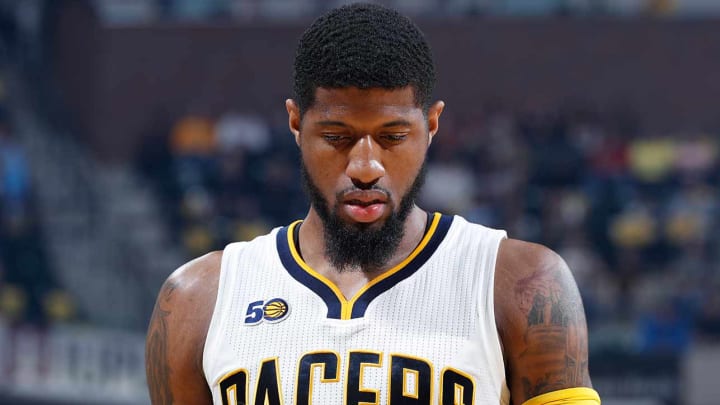With Larry Bird Gone, What's Keeping Paul George In Indy?

The dissolution of the smashmouth, contending Indiana Pacers remains one of the strangest NBA stories this decade. Lance Stephenson seemed to fold in the middle of a season, only to later overplay his hand when it came time to re-sign. Roy Hibbert was one of the league’s most important players one moment and completely irrelevant the next. David West declined a $12 million option to get the hell out of town. Frank Vogel was unceremoniously fired, George Hill was shipped off for Jeff Teague, and soon all that remained of an organically built powerhouse were the superstar and the architect.
Friday brought one more release to that growing, gradual obituary. According to Adrian Wojnarowski of The Vertical, Larry Bird—Indiana’s president of basketball operations since essentially 2003—has decided to step down from his post. Even with long-time executive Kevin Pritchard in place to succeed Bird immediately, this is a destabilizing move for a franchise gripped with the uncertainty surrounding its best player. Paul George is in control. The franchise itself obviously goes beyond any one player, but the resource structure in the NBA creates an orbit around superstars. There are only so many Paul Georges. Bird managed to draft one and to build a high-level team around him, but all that’s happened in the years since has cleared a path for his eventual exit.
Every executive in basketball leaves behind a complicated history of missed opportunity and well-intended moves gone awry. The trouble with Bird is that we’re still seeing some of Indiana’s missteps play out in potentially devastating moves. It wasn’t the signing of Monta Ellis or the addition of Al Jefferson or the hiring of Nate McMillan that did the Pacers in. It was the sum of their odd maneuverings and self-contradictions, all of which left George frustrated and ready to vent whenever he encountered a microphone. The longing in George’s voice whenever he spoke about the identity the Pacers once had should be distressing to the organization as a whole. Bird’s primary job over the past few seasons was to cement an infrastructure that George would be loathe to leave. In that, he failed. The dynamic that led him to that failure—fraught with injury, rotten luck, and inexplicable decline—isn’t entirely Bird’s fault, but none of that will change George’s concern for his playing prime.
Any urgency for Pritchard to move on the matter must come from George, in impression if not direct action. George is guaranteed by contract to be a Pacer through the 2017-18 season. After that, he can become an unrestricted free agent. This is a dangerous possibility for the Pacers, particularly if they aren’t able to offer George a dramatically larger contract than any potential suitors. That, oddly enough, hinges on whether George is selected to one of this year’s All-NBA teams by select media members—a nod which would have been more likely had the Pacers been a better, more visible team to begin with. Indiana’s errors fold over. The very factors that made the Pacers such a frustrating team this season may wind up giving George some added, separate incentive to leave.
The Greek Freak Falls Victim To His Achilles Heel
The problem Indiana faces is this: What basketball reason have the Pacers given George to want to stay? They have tried to play smaller only to aggravate him. They have claimed they would play faster only to sign personnel to the contrary. Teague himself could bolt in free agency this season, and even re-signing him to sustain would eat into the Pacers’ cap room—one of their only avenues for improvement—rather substantially. They put their roster in such a state that the returning Stephenson, twice waived by other NBA teams last season, became one of their better rotation players. Even the most ardent supporters of Myles Turner would have a hard time building a compelling case. One can’t just presume to know what George wants, but anyone following the league can see what kind of basketball situation he’s been presented.

Rob Mahoney is an NBA writer dedicated to the minutiae of the game of basketball, its overarching themes and everything in between. He joined the Sports Illustrated staff in 2012.